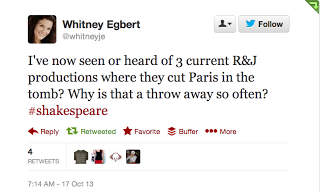So a few weeks ago I’m at one of those elementary school fairs you see from time to time, where they set up some inflatable jumpy houses for the kids and a few arts and crafts picnic tables, and a bunch of local vendors set up tents on the lawn and showcase their wares. This one actually is for my niece, and until that morning I had no idea I was even going.
I spy a booth with books! As I always do, I scan for Shakespeare and quickly spot Shakespeare’s Storybook by Patrick Ryan. The shopkeeper tells me, “That one is actually a collection of the fairy tales that Shakespeare used as the source for some of his stories!”
I give her the raised eyebrow. “According to whom?”
“….research?” she replies, likely having never been asked that question before. She flips to the back of the book and shows me the bibliography.
Fair enough. I buy it and take it home. Worst case I’ve got blog content, and something for the kids to read.
The book itself is simply structured, offering up a very high level summary of the play, followed by its connection to the fairy tale. Some connections are more questionable than others.
First we have Romeo and Juliet connected to a story called Hill of Roses, about the star-crossed couple who use red and white roses to communicate their plans to meet secretly. That is, until Julietta’s kinsman Tibbott causes the death of Romeus’ friend Quicksilver, and tragedy piles upon tragedy.
What I can’t fully figure out is whether these are supposed to be stories that already existed, that Ryan has compiled? Or originals that he has rewritten? Because when I search for “hill of roses” and “shakespeare” I get literally no hits … other than references to this book.
But then later in the book we get the comparison of King Lear to the “Cap-o-Rushes story”, a connection which is well documented, if tenuous. The story itself has almost nothing to do with Lear, other than the opening about what disagreement might have caused the falling out between father and daughter in the first place. Other than that the story is classic fairy tale and looks more like Cinderella than Shakespeare.
It’s a fun book, and I think the kids will enjoy it, but there’s not really any Shakespeare in it other than a couple of plot devices. We learn that As You Like It is really a cross between Snow White and Robin Hood. Our Petruchio and Katherine have to deal with an evil water spirit, and our Portia is happy to live the single life. So I’m finding it amusing to read about how closely each fairy tale mirrors Shakespeare’s story, and where I’ve seen elements of it elsewhere (such as the Cinderella one).
The really neat coincidence, and I mentioned this in a previous post, is that my son’s second grade teacher brought up the fairy tale connection to Shakespeare before I could suggest it. So it looks like this book will fit in perfectly! Either I can pick a story they know (like Snow White) and cross over, or I can pick some Shakespeare they are more likely to know (Romeo and Juliet / Gnomeo and Juliet) and come in that way. Should be fun!


